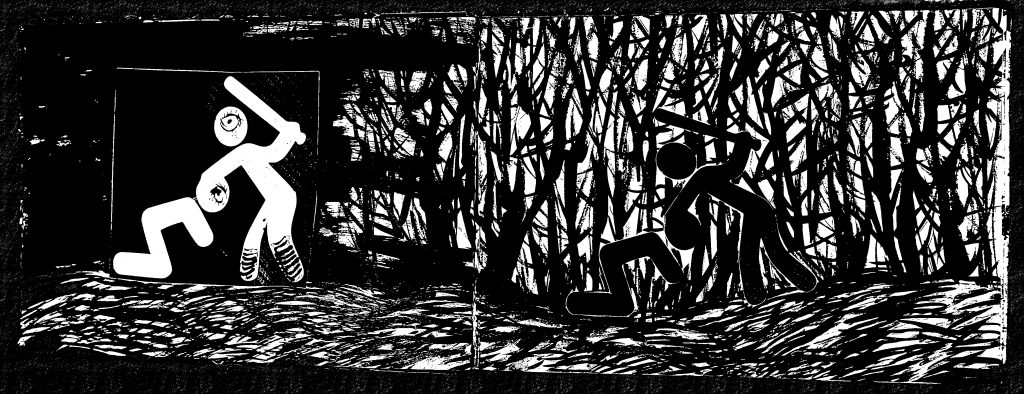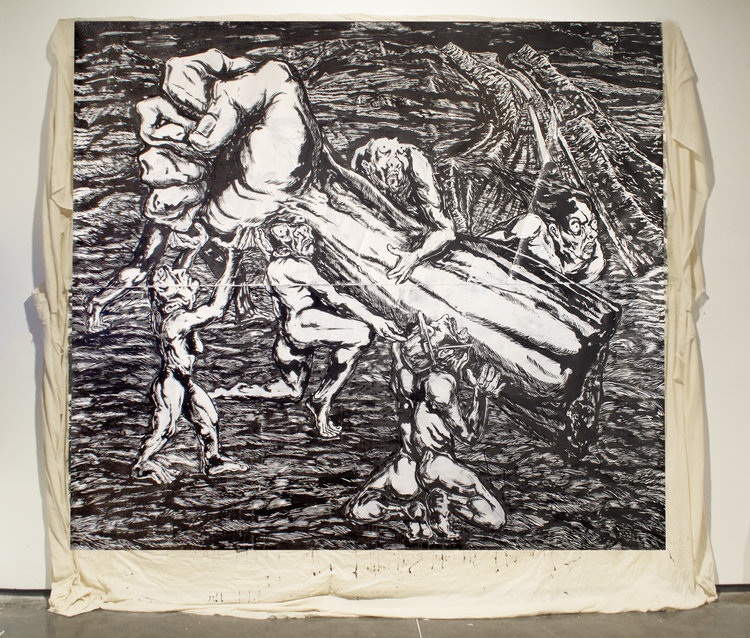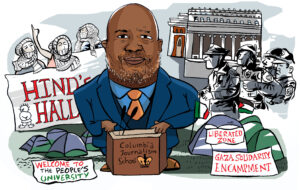
‘Will You Hate Him, as You Hate me’ Muslim Hating in the Bone of the Nation – Book Excerpt

Arundhati Roy defined Body on the Barricades. Life, Art and Resistance in Contemporary India as “a series of meditations on hatred, tenderness, grief, mourning, labour, resistance, social justice and the possibilities of meaning and solidarity, all viewed through the lens of some traumatic events that have convulsed India in recent years.”
We reproduce here an excerpt of the book.
Body on the Barricades, by Brahma Prakash, published by LeftWord Books, Delhi (mayday.leftword.com), pp. 210, INR 325 (USD 18).
Excerpt reproduced with permission. Footnotes withheld for readability.

Write
Write Down
I am a Miya
My serial number in the NRC is 200543
I have two children
Another is coming
Next summer.
Will you hate him
As you hate me?
Yes, we will hate him as we hate you. We don’t have any remorse for hating your children. It doesn’t matter whether you belong here or have a birthright. It is no longer about whether you are Bengali Muslims in Assam, or Bihari Muslims in Delhi, or the locals of Mumbai. It doesn’t matter if you are Sheikh, Pasmanda, Sufi, or Faqir. It is no longer about good Muslims and bad Muslims; for us, you are a Miya — a Muslim. And that’s enough. It is ground enough to hate you and take your life and rights. We think that your religion is a threat to the global order. We believe that your presence is inauspicious in this sacred nation. You are a burden that the nation carries on its shoulder in the name of secularism. You are the common enemy of modern civilization. Your beliefs are the point of the clash — the core of the clash of civilizations. We can’t tolerate you. We can’t be friends.
‘One who eats beef can’t be believed by Hindus’ (‘Jo khaay gaay ke gosh, wo na hove Hindu ke dost’) — my mother, a lower-caste Hindu woman, warns and reminds me against befriending a Muslim person. An upper-caste Hindu cab driver repeated the statement a few years on. He reiterated: ‘Dil chir ke bhi de dega to ham viswas nahin karenge’ (‘We won’t believe them even if they rip apart their hearts for us’). The statement shows the level of hatred and fear ingrained in Hindu majoritarian sentiments.
Habeeb Miya, an auto driver in Bengaluru, remained in jail for years under the Unlawful Activities (Prevention) Act (UAPA), like so, so, so many others. The stringent nature of the law renders it difficult for one held under it to obtain bail. On his release, he asked, ‘[B]ut why was I in jail?’ He got a sadistic smile. The smile expressed the intention without speech, ‘Don’t you think you being Habeeb was enough?’ Himayat Baig was arrested in September 2010 under the charges of conducting the German Bakery blast in Pune. The court acquitted him of all the charges, but he remained in jail. The reason? We can guess. His name: Himayat Baig, a Muslim. The case against Umar Khalid, Ishrat Jahan, Safoora Zargar, Sharjeel Imam, and several others is about their identity.
Hope we remember the Kathua or the Jhabua rape cases — two infamous rape cases in which right-wing Hindus targeted Muslims. Then the incidents of heinous crimes of rapes and lynching shockingly united the Hindus! The plan of Hindutva politics is not only to punish Muslims; the point is also to keep mobilizing Hindus who otherwise remain fractured by castes and cultures. They otherwise cannot come out as a group or a community. This is perhaps the fundamental reason for the rising attacks on Muslims by the right-wing Hindu political organizations in contemporary India.
As much as these organizations depend on the Hindu electoral votes, this consolidation based on the politics of contempt remains crucial. In the aftermath of the Jhabua rape incident in the state of Madhya Pradesh, in 1998, the Vishwa Hindu Parishad (World Council of Hindus) leader B.L. Sharma said, ‘Rape was the anger of patriotic Hindu youth against the anti-national forces’. His speech did not go unnoticed. The Hindus of the region indeed felt united and mobilized. Time and again, similar situations also arise for other religious minority communities.
The same happened in the Kathua rape case in Jammu and Kashmir. Under the leadership of the BJP, Hindu groups came out on the streets to support the rapists. Beyond rights and moral dilemmas, they mobilized the Hindus who otherwise would still be hesitant to support a rapist. But since it was seen as a rape for the nation, they came together; it was revenge for what the Hindus felt to be the historical crimes committed by the Muslim rulers. All these crimes (from rape to lynching), being political crimes, are also being seen as sacred acts in which lie the security and sacredness of the nation and Hinduism. It was shocking but not surprising that while rallying for the rapist, they shouted ‘Bharata mata ki jai’ (Victory to Mother India) and ‘Jai Shri Ram’ (Glory to Lord Rama).
Let me say it without hesitation. It is hatred and contempt towards Muslims that unites the Hindu rashtra (nation). Hindu India as a nation will fall apart without this perpetual hatred. Ambedkar pointed out the impossibility of caste in forming a federation. He wrote: ‘A caste has no feeling that is affiliated to other castes, except when there is a Hindu-Muslim riot’. In other words, it is only in the feeling of hatred and fear that caste societies feel a sense of affiliation. It is only through the act of othering that Hindus can function as a society or as a nation. Since this becomes the foundation of the nation, whichever party comes to power performs this basic task — not only to gain political mileage, but also for the sake of ‘national’ unity. We have seen often enough how the assaults on Muslims unites the (Hindu) nation and re-energizes nationalism whenever it is in crisis, or feels that it is in crisis.
We know that hatred of Muslims is inherent in the politics of right-wing forces such as the BJP. But how do we see the role of the Congress and regional parties? Here lies the organization of politics around the Brahminical body politic. In fact, the rising attack on Muslims is more about uniting Hindus. This also shows the pitfall of liberal secularists’ claim of Hindu–Muslim unity that visualizes an imam smiling with Hindu pundits. The phoney claim of the Ganga–Jamuni tahzeeb (culture) rests on obvious fault lines. While the liberals recognize the attack on the Muslims, they don’t see another parallel phenomenon — the consolidation of the Hindus. Both are not mutually exclusive processes. They are two sides of the same coin.
This curtailment of the body and rights of minorities in India is not new, but there has been an obvious rise in recent years. It is believed that it all started with the social reform movements in the early twentieth century with the coming of the far-right Hindu organizations such as the Arya Samaj, Hindu Mahasabha, and Rashtriya Swayamsevak Sangh (RSS). It flourished during India’s nationalist movement led by the upper castes. It successfully merged language, religion, and nation together through the slogan ‘Hindi, Hindu, Hindustan’.
Communal ideology was seeded in the very idea of nationalism itself. It was a nation predicated on the upper-caste Brahminical ideology. In this process, both the mainstream social reform movement and the nationalist movement created Muslims as a common enemy. When the concerns are the foundational politics of the nation, the fault does not only lie with right-wing organizations. Despite their secular credentials, Gandhi and Nehru too identified Hinduism with the ideology of nationalism. In his letter to his daughter, Nehru wrote:
Hinduism became the symbol of nationalism. It was indeed a national religion, with all those deep instincts, racial and cultural, which form the basis everywhere of nationalism today.
What a joke! We are now talking about right-wing hatred towards Nehru, knowing that the hatred towards Nehru and Gandhi is not exactly hatred towards Nehru and Gandhi but towards Muslims. What they hate is their ‘appeasement’ of Muslims. Their distaste for secularism is equally propelled by their disgust for Muslims.





